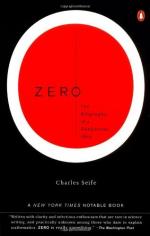
|
| Name: _________________________ | Period: ___________________ |
This quiz consists of 5 multiple choice and 5 short answer questions through Chapter 3.
Multiple Choice Questions
1. The author states in Chapter 3, “Nothing Ventured” that the Indians borrowed Greek geometry but never worried about what?
(a) Symbols for numerals.
(b) The Pythagorean Theorem.
(c) The diagonal of the square.
(d) Recording or calculating area.
2. What was the Pythagorean cult’s most sacred symbol because it contained the golden ratio?
(a) The hexagram.
(b) The sphere.
(c) The diamond.
(d) The pentagram.
3. What was the fifth element that Aristotle proposed, in addition to earth, water, fire, and air?
(a) Metal.
(b) Sanctities.
(c) Aether.
(d) Volume.
4. Pythagoreanism developed into two separate schools of thought. What group was called “the listeners” in Greek?
(a) The mathēmatikoi.
(b) The akousmatikoi.
(c) The omnimatioi.
(d) The Hippasusikoi.
5. Any number multiplied by zero equals what?
(a) 1.
(b) -100.
(c) 15.
(d) 0.
Short Answer Questions
1. The House of Wisdom was based in Baghdad during what centuries?
2. What term refers to the religious or philosophical concept that the soul is reborn after biological death?
3. What term refers to an argument that produces an inconsistency?
4. The author states in Chapter 3, “Nothing Ventured” that for the Indians, numerals without geometric significance gave birth to what field of mathematics?
5. What region in the Middle East is widely considered to be the cradle of civilization?
|
This section contains 229 words (approx. 1 page at 300 words per page) |

|




